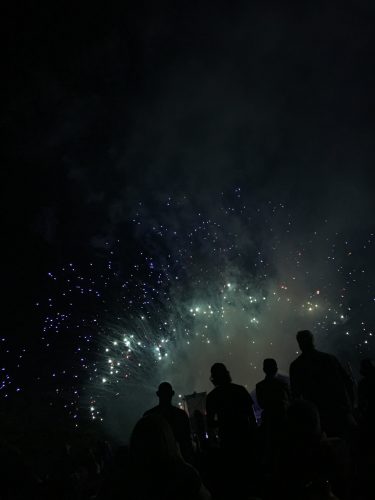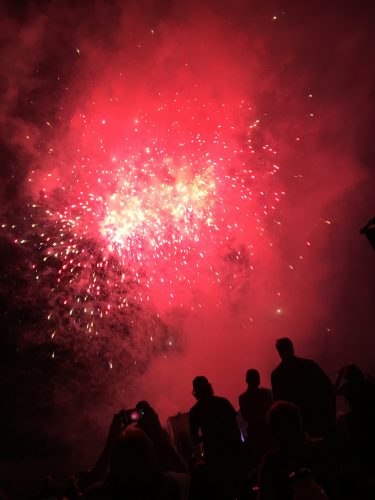Growing up in Minnesota, I have always been familiar with the phrase “Minnesota Nice.” I have always appreciated this phrase and even believe there is some truth to the phrase. In my experiences, I have always found Minnesotans to be generally nice people.
Needless to say, I was more than a little bit skeptical when, as I was preparing for my summer in New Orleans, people repeatedly told me that the people of New Orleans are “the nicest people you’ll ever meet.” I wondered how this could be true when the word “nice” is literally in Minnesota’s nickname.
The last thing I expected was to come to New Orleans and actually agree with the statement that I originally found so irritating. But I soon realized that New Orleanians take niceness to a whole new level.
It’s people like the bus driver who started calling me his best friend when I wouldn’t have expected him to even recognize me after picking up and dropping off hundreds of passengers each day.
Or like the employee at the grocery store who told me I looked happy and encouraged me to keep smiling because my smile had made him smile that day.
Or like my lovely supervisor who regularly shows up to work with fresh blueberries, fresh Creole tomatoes, or fresh carrots for me because she knows I’d like them. And who drives 30 minutes out of her way to drop me off at my apartment just because she doesn’t want me to take public transportation in the rain.
It’s these people and so many more who go out of their way to make you feel so appreciated and important. They exemplify the welcoming and supportive culture that is present in every corner of The Crescent City.
While these people and instances clearly show the strength of New Orleans’ friendly community, I recently had two interactions that truly illuminated the depth of the New Orleans kindness.
On the 3rd of July, our group went to City Park to watch fireworks. The event was free and open to the public, featuring music by the Marine Corps Band.
We arrived at the park about half an hour before the fireworks were scheduled to begin. At this point, the park was already packed with hundreds of people clustered around the lawn in front of the bandstand, sitting with their friends and family in chairs or on blankets. It was obvious that many people had been at the park for hours and had clearly claimed their spots.
We wandered for a bit, searching for an open space big enough for us all to sit. We landed at a small spot in the middle of the lawn between two groups of people. We stood around anxiously for a few minutes, trying to decide if it would be okay for us to sit on the ground in this open space.
I felt uncomfortable the entire time, worried the surrounding families would be irritated with us for just showing up and inserting ourselves into their space. And had they been upset, I would have completely understood their frustration because, if I was in their place, I am almost certain I would have perceived the oblivious college students as rude and inconsiderate. I would have wondered how they didn’t realize that these people had been at the park for hours trying to ensure a good view of the fireworks. All these thoughts and more were running through my mind as we started to sit down.
Immediately after sitting down, a man from the group behind us approached us and offered us some of his peanuts. We all smiled sheepishly and politely declined. But he was persistent. It was clear he really wanted to share his snacks, so we accepted his offer.
We then talked with him about the years and years he spent coaching all different types of sports. Later, during the fireworks show, he insisted that we all try using his 3D glasses to watch the colors bursting in the sky. That night, this man said something that really stuck with me: “In New Orleans, we share everything.”


I didn’t expect something as simple as a man sharing his peanuts with our group to have such an impact on me. But the man didn’t have to do that. He had no obligation to even acknowledge us. Personally, I would not have even held it against him if he had been offended by us sitting in front of him.
But none of that mattered to this man. He didn’t care that we arrived much later than him or that we had taken some of his group’s space. Instead, he simply wanted to make sure we enjoyed our night. He wanted to share his experience with us. And for that, I am very grateful.
While commuting to work about a week later, I had another interaction that further revealed the kindheartedness of New Orleanians.
I had gotten off the streetcar and was waiting for the bus to arrive when a man approached me and asked for a dollar. I apologized that I did not have cash on me and offered him some fruit from my lunchbox. He declined, so I expected him to continue on his way.
Instead, he continued to stand there. He then started making conversation. He asked me where I was headed and whether he had met me before, saying I looked familiar to him. I told him I worked at CrescentCare and that I took the bus every morning during my commute.
I instantly regretted my answer. Had I told him too much? I started to panic that he might try to follow me or that he would start to watch for me every morning.
My thoughts were swirling in my head, and I tried to tell myself I was being ridiculous and overreacting. I attempted to conceal my worry and to remain engaged in the conversation.
The topic turned to summer in New Orleans and then to amusement parks. Eventually, the bus arrived, and the man told me to have a good day and went on his way.
As I sat on the bus that morning, a ball of guilt swelled up in my stomach.
The man at the bus stop was nothing but friendly. He was not aggressive. He did not make inappropriate comments. He simply wanted to have a conversation.
Yet I judged him. I made unfound assumptions. I figured he must have malicious intentions since he didn’t leave after asking me for money.
But this was not the case. He was simply being friendly. I left this interaction with a newfound appreciation for the kindheartedness embedded in the New Orleans culture.
The New Orleans culture and community is unique. The people of New Orleans are not just nice—their kindness runs deeper than that. Even in Minnesota, it would have been perfectly acceptable if the man at the park had not interacted with our group or if the man at the bus stop had not engaged in conversation with me. But not in New Orleans. In New Orleans, being kind is not an expectation; it’s a way of life.
